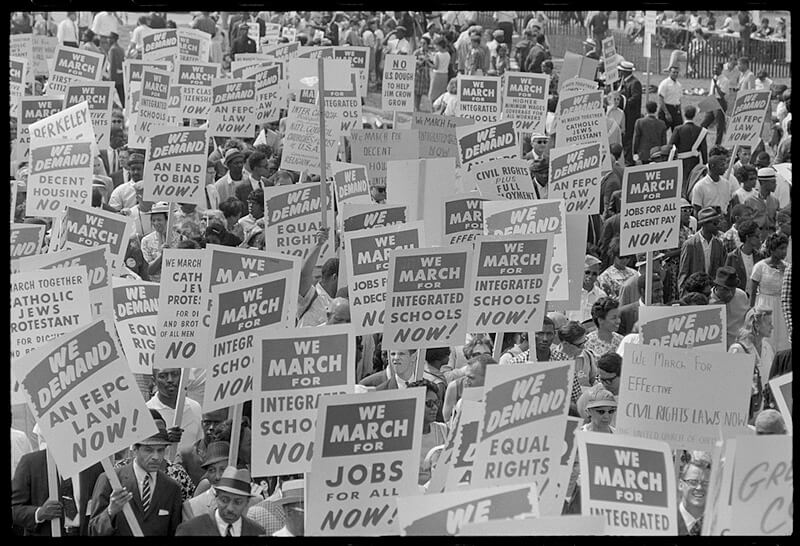To the early members of the Medical Committee for Human Rights (MCHR), the summer of 1964 might have had a similar feeling to this one.
The United States was caught up in widespread political and social unrest. Though opposition to the Vietnam War was growing, it was the tension, and increasing reality, of the Civil Rights Movement that shook the nation. A significant, important change was occurring.
Led by Dr. Martin Luther King and Malcolm X, the call for equal rights by black Americans would become one of the most powerful movements in the nation’s history, inspiring a level of change–and resistance to change–that has stayed with the United States since.
Both black and white physicians were important leaders in the wider movement, with the likes of Dr. T.R.M. Howard, Dr. Gilbert R. Mason, and Dr. Robert Smith, iconic within it.
“Of all the forms of inequality,” Dr. King told the MCHR, in 1966, “injustice in health care is the most shocking and inhumane.”
Another crucial element was the MCHR, which went from a small integrated volunteer effort, providing medical care for activists in Mississippi, to having Dr. King speak at their annual meeting two years later.
Though the organization no longer exists today, it would become a leading advocate of single-payer healthcare, and would inspire the phrase–‘heath care is a human right’–that the movement uses today.
“Of all the forms of inequality,” Dr. King told the MCHR, in 1966, “injustice in health care is the most shocking and inhumane.”
In an exhaustive, well-written history for the American Medical Association (AMA)’s Journal of Ethics in 2014, civil rights historian John Dittmer noted that, in the summer of 1964, around 100 “mostly Northern” physicians headed to Mississippi.
Mostly relatively experienced doctors from private practice and med schools, the early group helped participate in what was known as the “Freedom Summer,” with the focus of helping register and support black voters.
Founded by Dr. Walter J. Lear, Dr. John L.S. Holloman Jr., and Dr. H. Jack Geiger, amongst others, the MCHR was the child of an earlier group, the Medical Committee for Civil Rights (MCCR), which had similar membership.
The MCCR provided medical support during the famed 1963 March on Washington, and would picket an AMA convention asking them to “end all segregation and discrimination in medical care.”
Though Dr. Smith, one of the few black physicians in the state, provided guidance and connections, the MCHR faced huge challenges in segregation-entrenched Mississippi.
Dittmer wrote that Archie Gray, the head of the state’s Department of Health and “vehement segregationist,”, denied them the ability to get licenses, while, incredibly, administering first aid was banned.
“They examined summer volunteers, treating their minor ailments,” Dittmer wrote. “They also discovered that a good number of the veteran civil rights activists were suffering from what psychologist Robert Coles labeled “battle fatigue.”
“Providing psychiatric care and “rest and recreation” opportunities for burnt-out civil rights workers became an important function for [the] MCHR.”
Their work was a success, leading to the organization establishing itself permanently in New York the following year with staff and chapters across the country. Famed physicians like pediatrician Dr. Benjamin Spock, cardiologist Dr. Paul Dudley White, and trail-blazing black doctor Dr. Paul Cornely would join its ranks.
Led by Dr. Alvin Poussaint, MCHR’s Jackson office made “a significant contribution to ending hospital segregation” (Dittmer), fought to force the AMA to ensure affiliate state associations allowed black physicians, and opened a free community clinic in a rural West Mississippi county.
Inspired by a concept Geiger saw in apartheid South Africa, the clinic, located in Mileston, was one of the first community-orientated primary care centers in the United States. Its presence would lead to two more, sponsored by Tufts University, being funded by the Office of Economic Opportunity.
Upon visiting one, Senator Edward Kennedy, who’d later become a public healthcare champion, got more than $50 million from congress to build more. By the early 2010s, nearly 1200 similar medical centers, serving more than 21 million Americans, were in operation.
Though the MCHR helped pressure med schools to include more black students, along with opening a number of free inner city clinics across the U.S., their last big push was for single-payer health care, in the early 1970s.
Though the Medicare program was made into law in 1966, lobbying and pressure from the AMA, pharmaceutical giants, and the private health insurance industry meant that fight remained unwon when the MCHR eventually folded in the 1980s.
The United States’ controversial first step towards nationalized healthcare finally came with the passing of the Affordable Care Act, or ‘Obamacare’, in 2010.
Physicians for Human Rights, who have denounced the violent death of George Floyd at the hands of Minneapolis police, and Physicians for a National Health Program, were also inspired by the MCHR, Dittmer wrote.
While the last week of nationwide protest and frustration is new to the younger generations, it only proves the struggle against injustice is one continually being waged.
Even with the COVID-19 crisis consuming valuable resources, American physicians will no doubt find themselves in the fight against it yet again.



